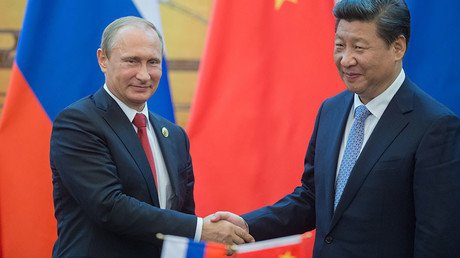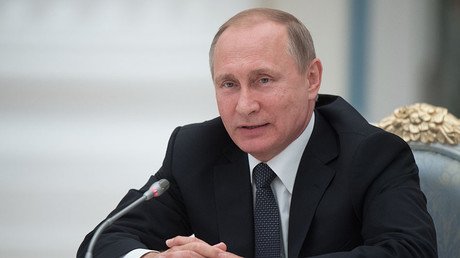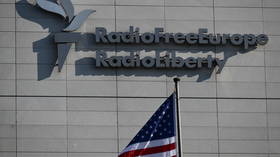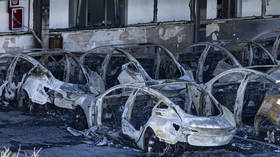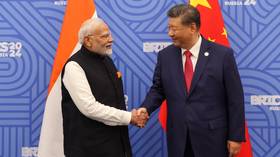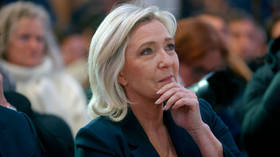Unwise Obama policy pushes China and Russia closer together
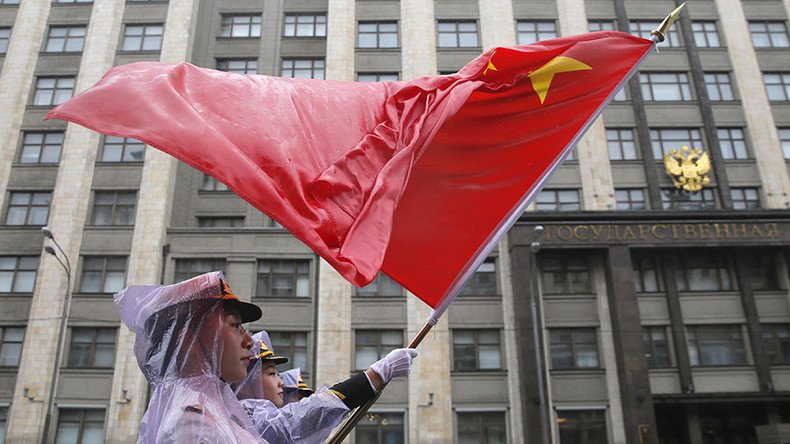
President Vladimir Putin’s visit to China on June 25 will continue the tradition of frequent high level Sino-Russian meetings that have been going on since 2014. In 2015 Putin and China’s President Xi Jinping met four times.
During their meeting in Beijing, Putin and Xi are expected to discuss economic cooperation and the geopolitical issues – such as the situation in Syria, the deployment of the American THAAD missile defense system in South Korea, and the growing tension between China and local US allies in the South China Sea.
According to the Russian ambassador to China, Andrey Denisov, Chinese trade with Russia is still no match to its trade with America, but the gap has been narrowing during the last 25 years. “If it had not been for the dramatic fall in oil prices, the volume of trade between Russia and China in 2014 would have exceeded $100 billion,” Denisov told the Interfax news agency.
Moscow and Beijing had to restart trading in the early 1990s almost from scratch: as the frosty relations between Maoist China and the Soviet Union in 1960s-1970s had brought trade almost to a standstill. The Soviet Union and China had ideological differences, which the pre-neocon US used with great skill, reorienting the Chinese economy to cooperation with American companies in the 1980s and 1990s.
Today, the opposite is happening. In Denisov’s words, Russia and China are now seeing eye to eye on Syria, US-inspired “regime changes” in many countries and other important international political problems. Meanwhile, Sino-US cooperation has been put under political pressure by Washington’s concern about China’s “peaceful rise” (the favorite expression of the Chinese foreign ministry, describing China’s growth as devoid of imperial ambitions). The new configuration of forces on the world stage reflects in the dynamic of Putin-Xi summits.
At least two of the last year’s meetings between the leaders had an important symbolic meaning. The BRICS’ summit in Ufa - the capital of an autonomous region with a mostly Muslim population in central Russia - took place in July 2015. The Ufa summit is seen now as the most productive in terms of BRICS’ development projects, with the creation of joint development banks and currency pools. Putin’s attendance of the celebrations commemorating the 70th anniversary of the end of the World War II in China in September 2015 also had an important symbolic meaning. The Chinese celebrations then were boycotted by US President Barak Obama and other Western leaders, despite China being an ally of the US in that war, which by far lost the largest number of people among the countries that fought Imperial Japan.
“The Sino-Russian relations are given a special boost by the fact that they are currently based on mutual respect,” said Professor Yang Xiyu, senior fellow at the China Institute of International Studies. “You don’t always see that in China’s relations with Western countries.”
Signs of respect for China from Washington have been especially slow in coming. The absence of President Obama at the parade in Beijing in 2015, which commemorated the victory of the Sino-Russian-American coalition in the war with Japan, was unofficially explained by Obama’s unwillingness to support a show of China’s military might.
US Democratic presidential candidate Hillary Clinton, during her campaign in 2015-2016, was not particularly sympathetic to China, describing President Xi as a "shameless".
Descriptions of China as an aggressive power, posing a threat to both its neighbors and the US, have been made this year by senior US defense officials with connections to Clinton. The recent naval exercises in the South China Sea, conducted by American warships with the navies of United States’ allies, had a specific goal of checking Chinese ambitions in the area, i.e. showing Beijing its place. The US Defense Secretary Ashton Carter labeled China's behavior in the South China Sea "self-isolating" and visited American aircraft carriers in the area.
“I don’t think Russia needs to get involved in the Sino-American rivalry in the South China Sea directly,” said Aleksandr Lukin, the director of the Center for East Asian Studies at MGIMO University in Moscow. “But this rivalry creates an important part of context for Sino-Russian relations, making the Chinese side to be more forthcoming to Russia’s needs and worries.”
Experts agree that in May 2014 it was Obama’s hostile policy towards both China and Russia that pushed the Chinese to agree to higher prices for Russian natural gas. The natural gas will be supplied to China via the 2,500-mile Power of Siberia pipeline – now under construction. The deal, worth $400 billion over 30 years, was helped by the fact that days earlier Obama promised American support to just about all of China’s rivals in South-East Asia.
The EU is also helping Russian-Chinese cooperation by threatening to reduce its “dependence” on Russian energy. The recent threat by the European Commission President Jean-Claude Juncker to apply the same EU legislation to the newly planned Nord Stream-2 pipeline - which foiled Russia’s South Stream project to supply gas to Greece and Italy - will no doubt make Russia’s “turn to the East” timelier than ever.
“Russia’s turn to China is natural, and wise people would not need the EU and the US to tell them that Russia had to look east at last,” said Sergey Karaganov, Dean of the Faculty of World Economy and International Affairs at the Moscow-based Higher School of Economics. “But we had a lot of illusions about the West, for many years after the fall of communism in 1991. We should thank the disastrous leadership of Mr. Obama and the Eurocrats for setting us on the right path.”
The statements, views and opinions expressed in this column are solely those of the author and do not necessarily represent those of RT.

